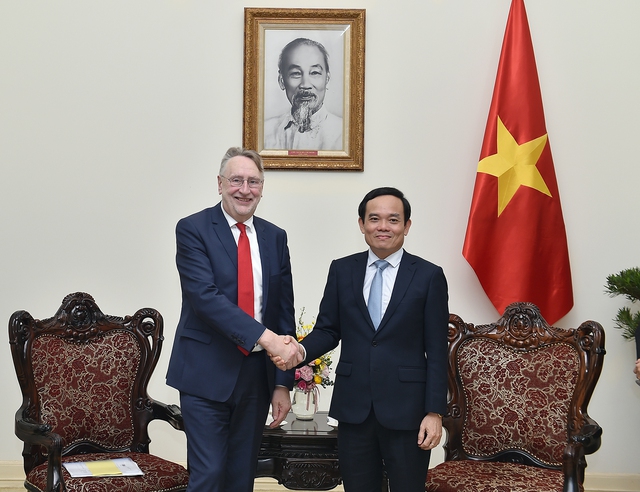Vietnam urges EU to move quickly on EVIPA, IUU
Vietnam stands out as one of the few Asian countries with the most comprehensive relations with the EU, being the only ASEAN nation to have established all pillars of cooperation with the bloc.
Vietnam urges the European Union (EU) to expedite the approval process for the EU-Vietnam Investment Protection Agreement (EVIPA) and to lift the "yellow card" sanction imposed by the European Commission (EC) on Vietnamese seafood due to concerns about illegal, unreported, and unregulated (IUU) fishing.
| Deputy Prime Minister Tran Luu Quang and INTA Chairman Bern Lange. Photo: Hai Minh |
Deputy Prime Minister Tran Luu Quang shared this view during a meeting with the Chairman of the Committee on International Trade (INTA) at the European Parliament Bern Lange on January 18.
During the meeting, Quang reaffirmed that the EU is a key partner in Vietnam's foreign policy and praised the positive outcomes, both quantitative and qualitative, of cooperation between Vietnam and the EU, as well as with individual EU member states.
The EU is Vietnam's fourth-largest trading partner, the sixth-largest investor, and the largest grant donor.
Vietnam stands out as one of the few Asian countries with the most comprehensive relations with the EU, being the only ASEAN nation to have established all pillars of cooperation with the bloc, he said.
Vietnam, along with the Philippines and Indonesia, is one of the three Southeast Asian countries implementing key projects under the EU’s "Global Gateway" strategy. The aim is to foster smart, clean, and secure connectivity in the digital, energy, and transportation sectors, and to reinforce global healthcare, education, and research systems to promote sustainable development and address global challenges.
The Deputy Prime Minister expressed hope that the EU and its member states will continue to share experiences and provide financial and technological support to enhance Vietnam's capacity in dealing with climate change and green energy transition. He emphasized the importance of fulfilling the commitment to achieve net-zero emissions by 2050 and promoting sustainable development.
Quang also urged Bernd Lange, given his role and influence, to play a crucial role in encouraging the remaining 10 EU member states to ratify EVIPA as soon as possible. This, he believes, will boost equitable investment relations between the two parties.
On the IUU issue, he suggested that Bernd Lange use his influence to mobilize the EC to remove the "yellow card" on Vietnamese seafood exports, taking into account the country’s efforts to combat IUU fishing and taking into account the development gap between the two sides.
Bernd Lange, for his part, recalled the milestones in the negotiation and signing of the EVFTA. He highlighted the agreement's success both politically and economically, which has contributed to Vietnam's impressive growth, recognized by many EU members. Bernd Lange commended Vietnam's efforts in the fight against IUU, in particular, in monitoring fishing vessels and improving the legal framework. He recommended that Vietnam further enhance legal enforcement consistency among provinces and municipalities.
Regarding the approval of EVIPA, Bernd Lange mentioned a scheduled meeting with EU trade ministers next week to move forward on this important matter. He emphasized that the delay in approval was not primarily Vietnam's fault, but rather related to the internal policies of EU member states.
He expressed his positive evaluation of the stable, reliable, and cooperative relationship between Vietnam and the EU across various sectors and emphasized the need for close cooperation to deepen and broaden this relationship in the future.
In agreement with Bernd Lange's assessment, Quang stressed the importance of joint efforts to fulfill common commitments, strengthen dialogue, and share solutions to emerging issues. He advocated mutual support in multilateral forums and international organizations, seeing these as key principles for the substantial and effective development of the Vietnam-EU relationship, bringing tangible benefits to both parties.
In 2023, the total trade turnover between the EU and Vietnam reached $72.3 billion, representing a 5.3% decrease compared to 2022 due to global conditions. However, this trade volume still holds a significant share of Vietnam's economy.
Vietnam's trade surplus with the EU has increased steadily over the past two decades, rising from $1.3 billion in 2002 to $34.3 billion in 2023. The trade turnover has also witnessed growth in the export value of key products such as textiles, footwear, seafood, coffee, and electronics over recent years.
Despite the economic challenges in 2023, foreign direct investment (FDI) from Europe into Vietnam has continued to rise. In particular, Germany, as the leading economy in the EU, increased its investment in Vietnam to approximately $366 million, marking a significant jump from 2022.












